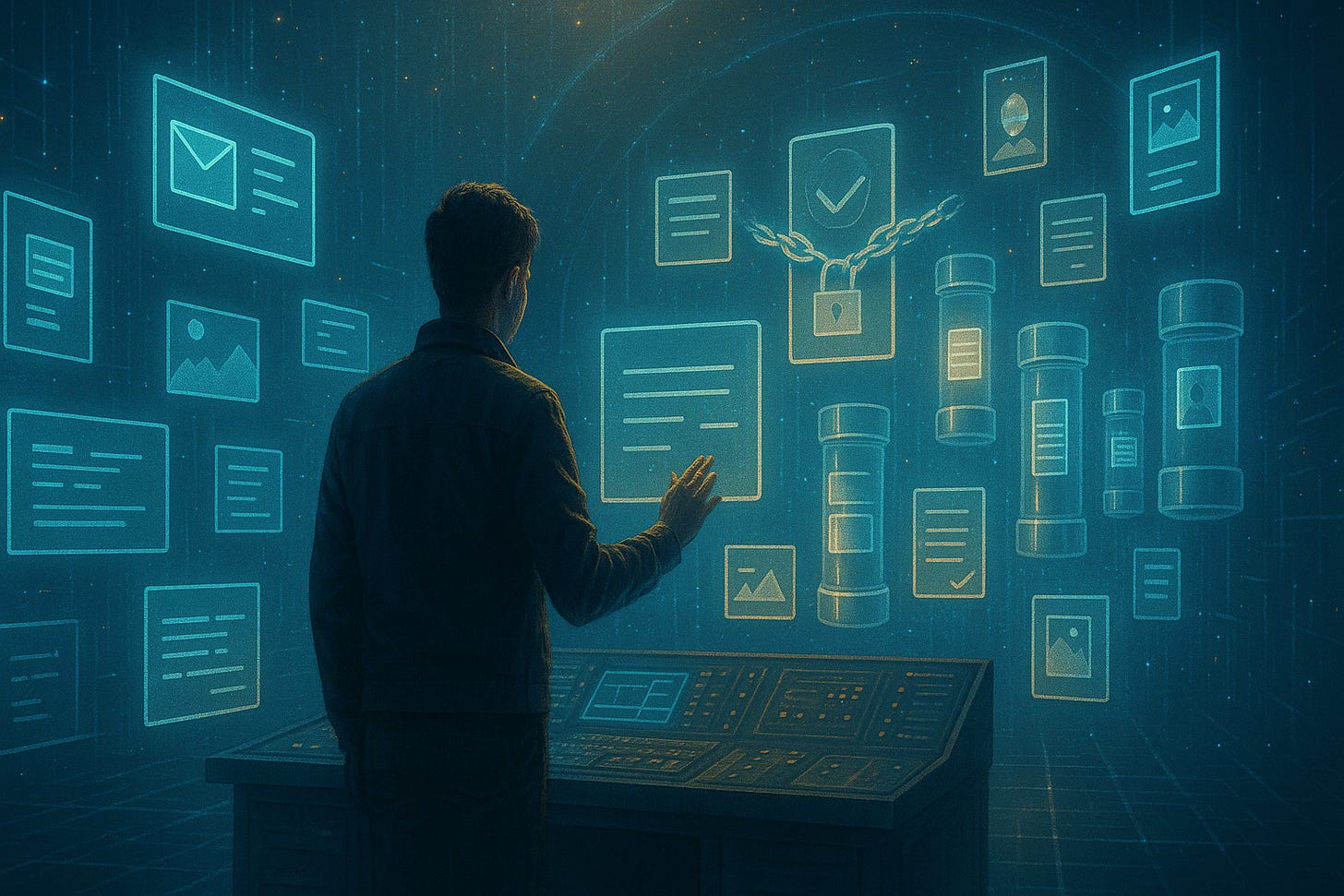Sometime back, I came across a fascinating little question about a man and a snail:
“You and a super intelligent snail both get 1 million dollars, and you both become immortal, however you die if the snail touches you. It always knows where you are and slowly crawls toward you. What’s your plan?”
I perceived this question as an exploration of the limits of what a person could do to live forever, and I came across quite a range of answers in varying levels of simplicity and brutality. Now, for the longest time, I have believed that we as humans should NOT live forever, that mortality gives our lives meaning and pushes us to do good today.
Lately, I have been forced to question myself. In a world where every word we say online is archived and stored, should our thoughts and words sustain beyond us, and should we strive for our digital presence to remain immortal even when we as humans aren’t? Let’s explore this problem in this newsletter issue.
What does “digital immortality” even mean? 🤔
When I say digital immortality, I’m not referring to some sci-fi concept of uploading our consciousness to the cloud. I mean how our digital footprint (tweets, blogs, videos, comments, memes, even DMs) outlive us.
Think about it: the internet today, especially social platforms, do not forget. Search engines surface decade-old posts in seconds. AI scraping tools preserve content forever. And archives like the Wayback Machine capture snapshots of us even when we try to delete them. In a very real sense, our online presence will outlive our biological life.
So the question is less about whether we achieve digital immortality, and more about what kind of immortality we are curating for ourselves.
Would our knowledge of this immortality affect our authenticity? 🧠
If we all internalize that our words and posts will live forever, our natural instinct is to self-censor. We will polish our personas, carefully curate the “acceptable” sides of ourselves, and slowly sand away the rough, human edges that make us real.
This isn’t hypothetical. It is already happening. Professional Twitter feeds look more like LinkedIn highlight reels than real reflections of people’s lives. Every post feels like it is written with an imaginary HR manager or future investor in mind.
But when authenticity erodes, honesty and vulnerability suffer. Instead of messy truths, we leave behind sterilized brands. The danger is that our digital immortality becomes a gallery of masks, faces we wore for safety, not who we truly were.
Humans remember the “words” but forget the “times” 🤷
There’s another problem. Even if we were our authentic selves, humans are terrible at preserving context.
Someone’s edgy joke from 2011 resurfaces in 2025, and people judge it by today’s standards. A rant written during a personal crisis might be stripped of its background and held as a definitive statement of someone’s character. Books have had this problem for centuries (rather, millennia), but that’s not a Pandora’s box I’m willing to open now. We remember the words, but we forget the times.
Immortality, then, doesn’t just immortalize us. It immortalizes our worst takes, half-baked thoughts, and rawest emotions, all frozen and decontextualized. And once context is gone, meaning distorts.
What can we do about it? 👀
Digital immortality may feel inevitable, but not all hope is lost. Changes are coming at a policy level worldwide. In the European Union, the General Data Protection Regulation (GDPR) defines the Right to Be Forgotten under Article 17, allowing individuals to request that data controllers erase personal data when it’s outdated, irrelevant, or obtained without valid consent. Here at home in India, too, the Digital Personal Data Protection Act (DPDP), 2023 includes a Right to correction and erasure of personal data.
There are several steps you can take to ensure more control of information about/you that is sustained on the internet:
Audit your digital footprint
Google yourself; verify what old posts, articles, or social media show up.
Take a moment to reflect. Ask yourself whether you would be comfortable with these being searchable in 10 years.
Clean up proactively
Delete or update old content you no longer stand by across all platforms.
Post with intention
Assume everything might persist, act accordingly.
Consider using ephemeral features (Stories, disappearing messages) for sensitive content.
Plan for your digital legacy
On Google, set up the Inactive Account Manager to determine what happens if your account becomes inactive.
Appoint a legacy contact on Apple and Facebook to manage or memorialize your account.
Consider documenting instructions about your digital accounts in your will.
Own your platform
Use personal blogs, newsletters, or self-hosted sites where you control retention. (Ironically, I haven’t done this yet for this newsletter; I will soon create a separate, independent archive of every article written here.)
Avoid relying entirely on platforms where you don’t control permanence.
Words SHOULD be locked in time 😮💨
Here’s where I land: words should live in time, not eternity.
Yes, archives and records have value. Historians and communities learn from them. But at a personal level, the idea of being permanently judged by a tweet, a thread, or even a blog without the context of the era it was written in is deeply unfair. Mortality protects us from being trapped forever by a single version of ourselves.
That’s why I’m against digital immortality. The right to fade, to be forgotten, is not just a privacy right. It’s a human right.
I understand that true erasure of information is pretty much a myth. Digital archives, screenshots, and caches will endure in some or the other corner of the digital world. But we as humans evolve. We outgrow ideas. We fail, learn, and move on. And our words deserve to be mortal, just like us.
Maybe the blessing isn’t in living forever online. Perhaps the blessing is in knowing that our voices mattered when they were heard and that we, like everything else in life, were fleeting. And that’s okay.








Love how you used images to immortalize the idea!!